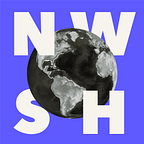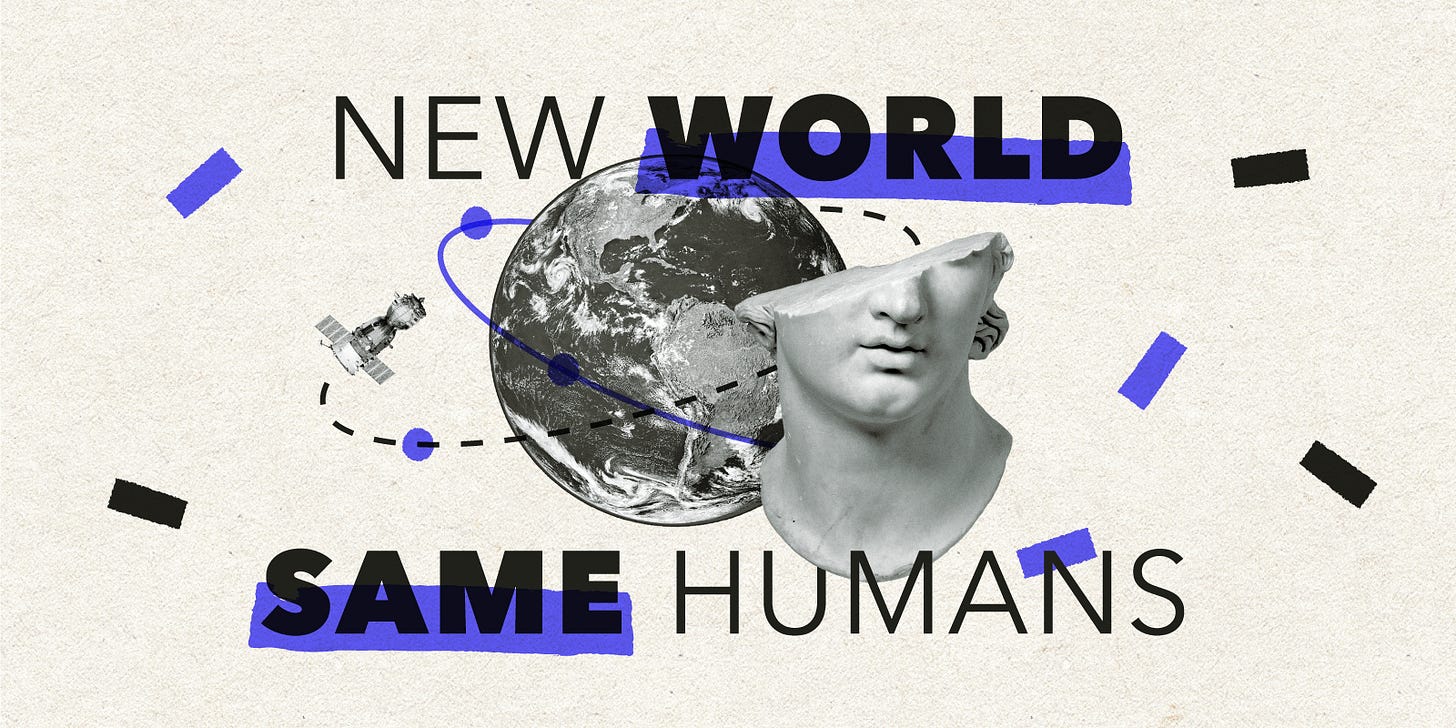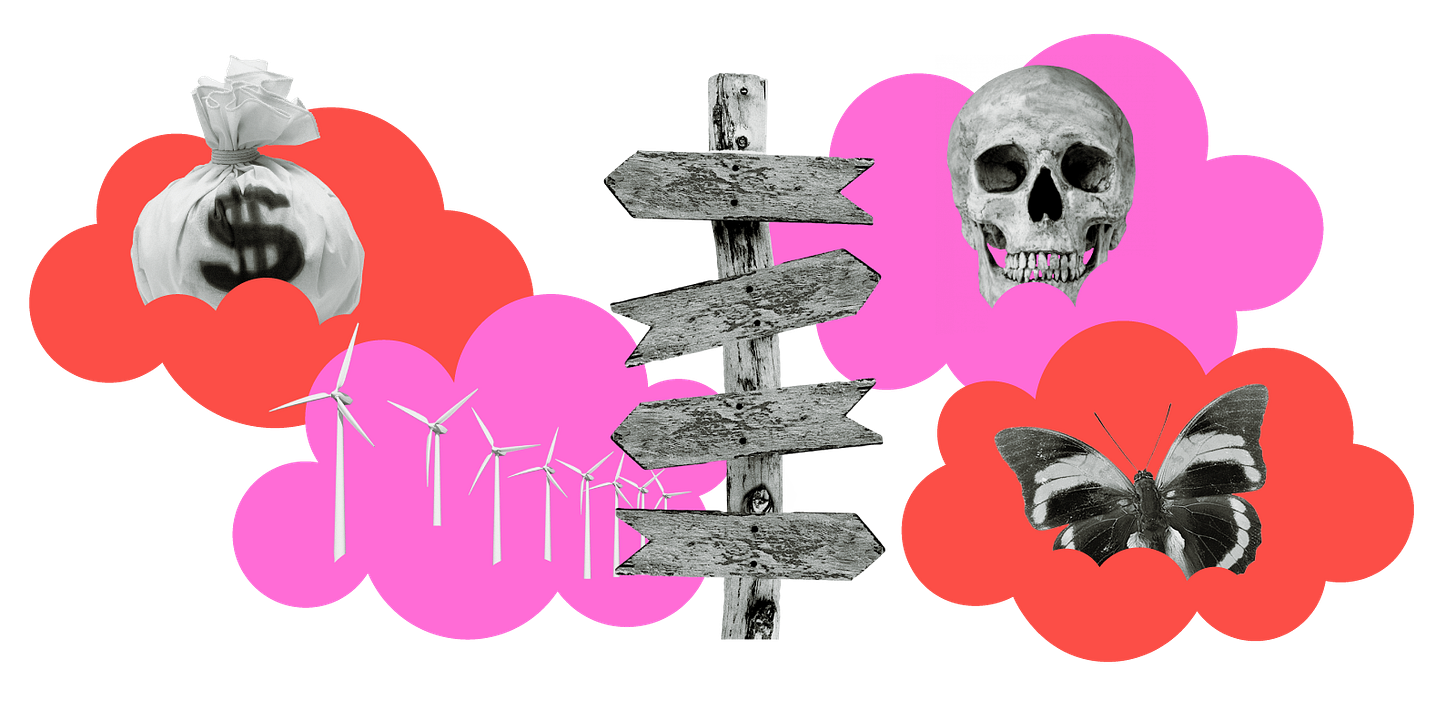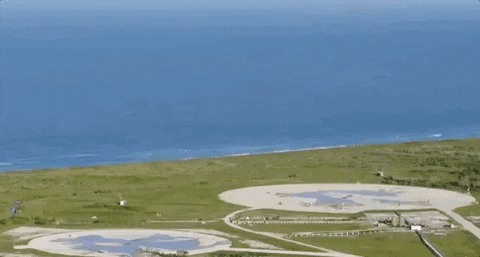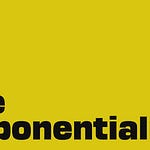Welcome to New World Same Humans, a weekly newsletter on trends, technology, and society by David Mattin.
If you’re reading this and you haven’t yet subscribed, then join 14,000+ curious souls on a journey to build a better shared future 🚀🔮
Spotify has shared the most streamed artist of this year. TikTok has celebrated the most viral video. But so far, one end-of-year retrospective is yet to be released.
So this week, I’m sharing the top five New World Same Humans essays from 2020. The final selection comes via a mix of science and subjectivity: I’ve considered data on the most read and shared, alongside my own view on which essays best hit their mark.
Together, these five essays are a tour through the many of the big themes that preoccupy this newsletter. The relationship between humans and technology. The nature of modernity; where it came from and what it has done to us. The Anthropocene. The future of democracy.
Also, an experiment to spread the Same Humans cheer. Each essay comes with a button that auto-generates a tweet; just hit the button to share your favourite essay from among this year’s top five!
Let’s spread the word, and grow our amazing community. Together, we’re going to do great things in 2021.
This week’s instalment is short and laden with links, so I’ve shared the full text below.
🏆 NWSH Top Five for 2020
1. The Four Futures Framework Can Change Your Life
The essay: The Four Futures framework is a tool for structured thinking about what lies ahead, developed by Professor James Dator. It says that all the stories we tell about the future fall ultimately into one of four categories: Growth, Collapse, Discipline, or Transformation. This essay examined how we can use Four Futures to map possible futures: for the world around us, our business, and ourselves. The most shared essay this year.
Where next? Dator created this framework back in the 1970s. Since then, it’s become clear that if we continue along our current trajectory, we’ll face ecological disaster. In Dator’s terms: Growth ends up in Collapse. In other words, the Anthropocene explodes the boundaries between Dator’s four categories. It’s time to update them to accommodate this new reality. More coming next year.
2. Should You Let an Algorithm Vote on Your Behalf?
Quick summary: The superstar futurist Yuval Harari has posed a now infamous question about the future of democracy. In a world in which algorithms know us better that we know ourselves, why should we vote? Why not let an algorithm vote for us? My answer: the question is built on a hollow understanding of the political. To stop democracy falling to our Algorithmic Overlords, we must rediscover politics as the arena of competing ethical visions for the human Good Life.
Where next? This essay drew together a number of ideas that I’ll keep exploring next year. In particular, I’m interested in the ways a hyper-individualistic, egalitarian, and connected society throws political representation – the idea that someone else makes important political decisions on my behalf – into crisis.
3. How Modernity Invented then Erased the Individual
Quick summary: A paradox sits at the heart of life inside modernity. On the one hand, 21st-century advanced consumer societies elevate each individual to a near-kingly status. On the other, they efface us as individuals by dwarfing us within a massive and complex social space in which it’s impossible to feel that we really matter. This tension is only set to grow. The pandemic represents a unique opportunity to redraw our collective lives at scales that are smaller and more human.
Where next? It seems to me that the search for smaller and more human will be a central project in the years ahead. The pandemic has given a hard lesson in the risks associated with a highly globalised world. So how do we reorient ourselves towards the local without becoming insular?
4. The Great Migration is Coming
Quick summary: It’s estimated that by 2050, 200 million people will have been displaced by global heating. Where will they go? The liberal democracies of the Global North face a dark dilemma. These rich nations are primarily responsible for the climate crisis. But if they accept migration on this scale – tens of millions of people each – they risk being torn apart.
Where next? This was darkest essay of 2020; I still find the implications hard to deal with. If the forecasts are even close to right, climate migration will be one of the great stories of our lifetimes. In the years ahead I want to write much more about that story, and not just commentary; this subject demands on-the-ground reporting.
5. We are Building a Tyranny of Convenience
Quick summary: Liberal democracy is built on the idea that individual freedom is the supreme value. And we’ve always believed that privacy is a foundational part of that freedom. But in 2020, we allow Big Tech access to our most private selves. No one forces us to do this; we are, it seems, tyrannising ourselves. To make sense of what’s happening, we need to call on a famous 20th-century idea about the nature of freedom.
Where next? Amazon’s new Halo device will monitor biological and voice metrics of wearers. California police are using drones to chase suspects. In other words, issues around privacy and Big Tech as a new form of socio-corporate power are going nowhere in 2021.
Cleared to land
Thanks for listening this week. And if you shared your favourite essay, make that double 🙏🙏
There will be two more emails this month before the newsletter pauses for Christmas. It’s been a wild year, but 2020 is finally coming in to land.
I’m so excited about what lies in store for the NWSH community next year.
The New World Manifesto project, for example, will see us come together to agree upon a set of core principles that should guide us all as we rebuild for the 2020s. Everyone is invited to the conversation! And I’m working to attach a great advisory board to the project, too.
More coming on that and other plans soon. In the meantime, I’ll be back on Wednesday with the final New Week Same Humans of this year.
Until then, be well,
David.

